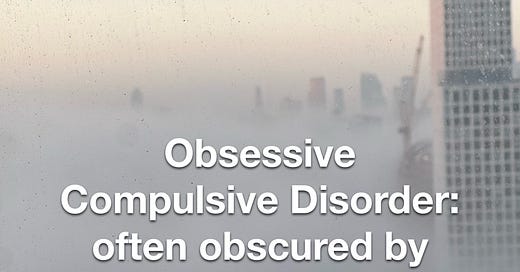I Don’t Have OCD! I Just Obsess Constantly in a Way I Cannot Control….
A frontier psychiatrist short!
OCD—It’s not just hand washing. It’s awful.
People who struggle with OCD have intrusive thoughts that recur repeatedly, and that they cannot stop thinking about, over and over and over. These thoughts are about more than just “being contaminated” and “washing your hands.” The thoughts can be like: “What if I killed someone? What if I am a secret serial killer?” or even “I might rape that child…what if I’m a pedophile?!” Psychopath serial killers or pedophiles don’t worry about those things. They are, in a way, free of doubt. They may have other problems, but they know for sure who they murdered and that they are sexually attracted to kids. They are not in doubt. The OCD brain is one that worries and doubts, checking on things repeatedly like most people check their phones.
Imagine if every time you checked your phone it wasn’t to see if you missed a text…
It was to make sure you hadn’t murdered someone. That’s crazy, of course you didn’t. BING. Let me check one more time. Phew. I guess I di—BING—maybe one more che—BING—I could go back home to double ch—BING. 8, 10, 22. This happens at all hours of the day. Every day. All day, nearly all the—BING—time. BING. BING. Wait, did I miss a message? I’ll just casually ch—BING.
And, perhaps, the most horrifying version of this is for people with “Harm OCD”, where sufferers become obsessed with suicide. Or, with the worry that they might complete suicide. Horrible images barge into your head, unbidden:
“EAT GLASS.”
“Hang yourself, there is rope, do it, hang yourself hang yourself hang hang HANG.”
“If you’re not careful enough…”
“How can you be so sure you won’t stab yourself in the neck with that pen? Maybe you should just go to the hospital, just in case you might?”
Even if you didn’t personally want to die at all, and you like your life otherwise, these sorts of thoughts that you can’t shake for hours are profoundly disturbing. This hellish stream of consciousness is the emotional equivalent of the grammatical train wreck that would be putting-dashes-between-every-word-in-a-sentence. Thoughts that for others would not be connected are inextricably linked. The “compulsive” symptoms are not the real story of OCD. Other people can see them, so they get a spotlight. They are a way to reduce the distress of thinking about awful things, if only for a few seconds. This is what coping looks like when your brain has a horror show on repeat. Obsessions are the core of OCD. People regularly suffer for years and have no idea this is not what other people are also experiencing in their heads. A person could be in their sixties before they timidly admit “I know it sounds crazy, BUT…” to their psychiatrist. And that might be a year into treatment. Or more. Or never. Who wants to admit to thinking about hurting children? Thought crimes aren’t real…except to people with an OCD-brain that is quietly condemning them for their evil, criminal, secret-psychopath thoughts.
No wonder 14% of people with OCD will attempt suicide at least once. Death-to-suicide rates in OCD are shown to range from 0.7% to 1.4%
This compares horrifically to other illness in terms of suicide risk (we measure these in “per 100,000”). The base rate for suicide rate in the population, per the World Health Organization, is 10.7/100,000.
OCD, in these terms, has a completed suicide rate of 700-1400/100,000.
To compare, in depression, it’s 214/100,000. Borderline personality disorder is a leader, at around 5,000/100,000 and schizophrenia is between 5000-14000/100,000. In bipolar disorder, in a 20 year follow up by Jamison and Goodwin, the rates of suicide were 9800/100,000. Eating disorders are higher still.
Yes, you read that correctly. OCD is more lethal in amount of death due to suicide than Major Depression. It’s also more common, and they both suck. But still. It’s almost an order of magnitude more lethal. (Reference here, in body text, because this is such a major claim: The Epidemiology of Suicide by Silke Bachmann, Int J Environ Res Public Health. 2018 Jul; 15(7): 1425.)
The most annoying symptom, “reassurance seeking”—checking with other people over and over—is a compulsion. For realz. “Did I offend you? Are you sure? Totally sure? But like…really? …cause….are you sure?” That is OCD till proven otherwise, it turns out. In the milieu of a psychiatrist's office, when someone says, laughing, “I’m kind of OCD about that.” it’s because they (very often) absolutely have actual OCD. That is the kind of problem that is among the most common things I’ve seen in my 60,000+ hours of clinical practice.
Thanks for reading this short—from the frontier!
—O. Scott Muir, M.D.





So good. I love this article about OCD and how people willfully obscure the notion that it is a real thing that gets in the way of someone's health.